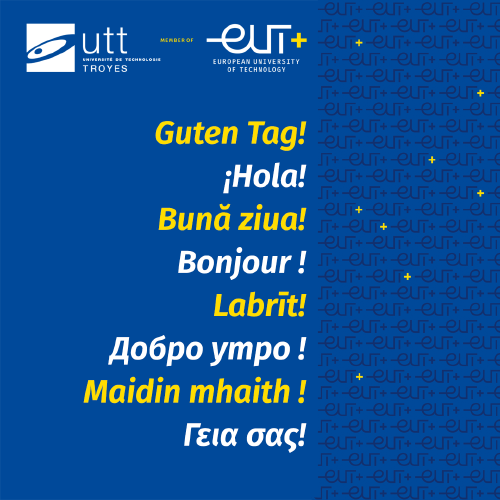Published on May 23, 2023
–
Updated on May 26, 2023

Dates
on the May 23, 2023
Staff across the alliance want to work together in a multilingual environment.
EUt+ created its Language Pool in November 2021 involving language experts from each partner to help it to become a multilingual entity. Since then they have worked consistently on mapping language courses, fostering research opportunities, sharing language expertise and developing pilot initiatives involving language learning and intercultural experiences.
A wonderful response now to their EUt+ Language for Staff initiative shows that staff across the alliance want to work together in a multilingual environment. The EUt+ Language for Staff pilot initiative has the aim of using the knowledge of native speakers in the respective EUt+ countries to deliver a course within the framework of multilingualism and interculturality.
Mostly these are introductory courses in English, German, French, Spanish, Greek, Bulgarian, Romanian and Latvian running between March and June 2023. Irish will run at a later date. Overall 603 staff across the EUt+ partners submitted expressions of interest to learn another language of the alliance. This included all of the local languages of the consortium. Unfortunately not every person who applied could be facilitated but courses are up and running for 220 staff in eight languages that include intercultural components as well as language learning.
Reflecting on the enthusiasm and the response the language staff are reflecting on their groups and adopting their approaches. Vessela Frengova, Vice director and senior lecturer at Technical University of Sofia highlights how the experience so far is very positive and they are using a team approach with different styles that work for different learners. Dr Anna Nicolaou, language academic at Cyprus University of Technology describes the Greek course so far as “a fruitful and joyful experience with the co-existence of people from different socio-cultural contexts making it a demanding and challenging initiative at the same time.”
A wonderful response now to their EUt+ Language for Staff initiative shows that staff across the alliance want to work together in a multilingual environment. The EUt+ Language for Staff pilot initiative has the aim of using the knowledge of native speakers in the respective EUt+ countries to deliver a course within the framework of multilingualism and interculturality.
Mostly these are introductory courses in English, German, French, Spanish, Greek, Bulgarian, Romanian and Latvian running between March and June 2023. Irish will run at a later date. Overall 603 staff across the EUt+ partners submitted expressions of interest to learn another language of the alliance. This included all of the local languages of the consortium. Unfortunately not every person who applied could be facilitated but courses are up and running for 220 staff in eight languages that include intercultural components as well as language learning.
Reflecting on the enthusiasm and the response the language staff are reflecting on their groups and adopting their approaches. Vessela Frengova, Vice director and senior lecturer at Technical University of Sofia highlights how the experience so far is very positive and they are using a team approach with different styles that work for different learners. Dr Anna Nicolaou, language academic at Cyprus University of Technology describes the Greek course so far as “a fruitful and joyful experience with the co-existence of people from different socio-cultural contexts making it a demanding and challenging initiative at the same time.”
Date of update 26 May 2023

